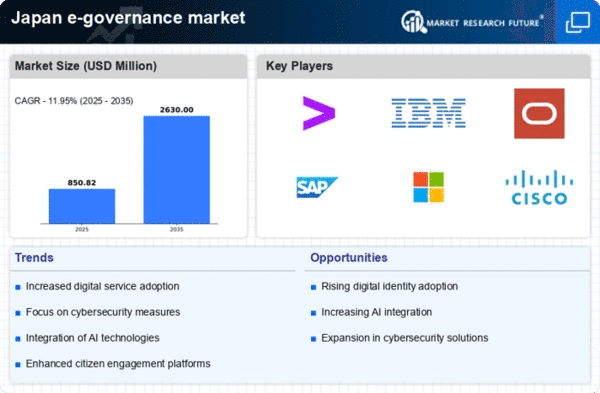Government Policy and Regulation
In Japan, the e governance market is significantly influenced by government policies and regulations aimed at promoting digital transformation. The government has established a comprehensive framework to facilitate the adoption of e governance solutions, which includes guidelines for data privacy, cybersecurity, and interoperability. As of 2025, the Japanese government allocates approximately $1 billion annually to support digital initiatives across various sectors. This financial commitment indicates a strong governmental push towards enhancing the e governance market. Furthermore, the introduction of new regulations encourages public sector organizations to adopt innovative technologies, thereby fostering a competitive environment that stimulates growth and development within the market.
Rising Demand for Digital Services
The e governance market in Japan experiences a notable surge in demand for digital services, driven by the increasing expectations of citizens for efficient and accessible government services. As of 2025, approximately 70% of Japanese citizens express a preference for online interactions with government agencies. This shift towards digitalization is further supported by the government's initiatives to enhance service delivery through technology. The e governance market is thus witnessing a transformation, as public sector entities invest in digital platforms to streamline processes and improve user experience. The integration of advanced technologies, such as artificial intelligence and big data analytics, is likely to play a crucial role in meeting these demands, ultimately leading to a more responsive and citizen-centric governance framework.
Advancements in Cybersecurity Measures
As the e governance market in Japan expands, there is a concurrent focus on enhancing cybersecurity measures to protect sensitive government data and citizen information. The increasing frequency of cyber threats has prompted government agencies to invest heavily in robust cybersecurity frameworks. As of 2025, it is estimated that the Japanese government allocates approximately $300 million annually to bolster cybersecurity initiatives within the public sector. This investment is critical for ensuring the integrity and confidentiality of digital services. The e governance market is thus adapting to these challenges by integrating advanced security technologies, such as encryption and multi-factor authentication, which are essential for maintaining public trust in digital governance. This proactive approach to cybersecurity may also encourage greater adoption of e governance solutions among citizens.
Increased Investment in IT Infrastructure
The e governance market in Japan is witnessing a substantial increase in investment in IT infrastructure, which is essential for the successful implementation of digital services. As of 2025, the Japanese government has earmarked around $500 million for upgrading existing IT systems and developing new digital platforms. This investment is crucial for ensuring that government agencies can effectively manage and deliver services to citizens. The e governance market benefits from this focus on infrastructure, as it enables the integration of advanced technologies, such as cloud computing and blockchain, which enhance the efficiency and security of government operations. Consequently, this trend is likely to attract further investments from private sector players, fostering collaboration and innovation.
Growing Emphasis on Transparency and Accountability
The e governance market in Japan is increasingly characterized by a growing emphasis on transparency and accountability in government operations. Citizens are demanding greater access to information and more opportunities to engage with public officials. As of 2025, surveys indicate that over 60% of the population believes that transparency in government processes is essential for building trust. This demand is prompting government agencies to adopt e governance solutions that facilitate open data initiatives and citizen engagement platforms. The e governance market is thus evolving to meet these expectations, as it seeks to enhance public trust and ensure that government actions are subject to scrutiny. This trend may lead to the development of innovative tools that promote civic participation and foster a culture of accountability.
















